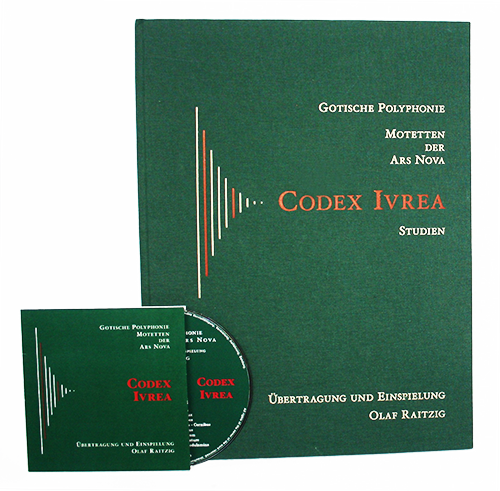For the following motets the respective scores have been posted. The corresponding tables of mensural notation and commentaries documenting the editorial process can be found in the book displayed below. In all these cases the text underlay was provided by Olaf Raitzig.
| Folio | Titel | |
| 1v-2r | O Philippe – O bone dux | |
| 2v-3r | Altissonis – In principes | |
| 3v-4r | Febus mundo – Lanista vipereus – Cornibus | |
| 4v-5r | Impudenter – Virtutibus | |
| 5v-6r | Apta caro – Flos virginum | |
| 6v-7r | Ida capillorum – Portio nature | |
| 7v-8r | Post missarum – Post misse modulamina | |
| 11v-12r | Almifonis melos – Rosa | |
| 12v-13r | Apollinis – Zodiacum |
For the following motets as well there are transcriptions including the text underlay:
| Folio | Titel |
| 15v-16r | Tuba sacre fidei – In arboris |
| 17v-18r | Colla iugo – Bona condit |
| 19v-20r | A vous, vierge – Ad te, virgo |
| 22v-23r | Mon chant – Qui doloreus |
For the remaining scores the text needs to be added at a later point (partially or completely). References to the exemplars used are found in the score.
| Folio | Titel |
| 8v-9r | Vos quid admiramini – Gratissima |
| 9v-10r | Flos ortus – Celsa cedrus |
| 10v-11r | Martyrum gemma – Diligenter |
| 13v-14r | Zolomina – Nazarea |
| 14v-15r | Cum statua – Hugo |
| 16v-17r | Rachel plorat – Ha fratres |
| 17v-18r | Colla iugo – Bona condit |
| 18v-19r | Tant a soutille – Bien pert |
| 19v-20r | A vous, vierge – Ad te, virgo |
| 20v-21r | Amours – Faus Samblant |
| 21v | Se grace – Cum venerint |
| 22r | Les l’ormel a la turelle – Mayn se leva |
| 22v-23r | Mon chant – Qui doloreus |
| 23v-24r | Douce playsence – Garison |
| 24v-25r | Qui es promesses – Ha, Fortune |
| 25v-26r | Se paour – Diex tan desir |
| 26v-27r | Si enseignament – De tous les biens |
| 37v-38r | Petre Clemens – Lugentium |
| 53r | Fortune mere – Ma dolour |
| 55r | Canenda vulgo – Rex quem |
| 55v | In virtute – Decens carmen |
| 56v-57r | Amer amours – Durement |
| 57v-58r | Trop ay dure – Par sauvage |
| 59v-60r | L’amoureuse flour – En l’estat |
| 60v | Clap clap – Sus Robin |

